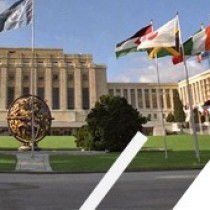
Reflections on the 37th session of the UN Human Rights Council
Version Française
Over the past five years, the human rights situation in the East and Horn of Africa has seen a continuous decline. Whether through open conflict or increasing restrictions – both legal and extra-legal – on civic space, the rights of citizens in the sub-region have been violated. Out of the eleven countries under our mandate, just three – Djibouti, Rwanda, and Uganda – weren't explicitly mentioned by the High Commissioner for Human Rights in hisglobal updateto the 37th session of the UN Human Rights Council (UN HRC). Only in Somalia did the High Commissioner note positive change.
|
After being rocked by mass protests for the past two-and-a-half years, the release of political prisoners and resignation of Prime Minister Hailemariam Desalegn in a bid to carry out reforms sparked hope for progressive change inEthiopia. However, the wave of arrests of prominent journalists and opposition members under a new six-month state of emergency has raised fresh concerns about the commitment to fundamental rights by this UN HRC Member State.
During a side-event, DefendDefenders (the East and Horn of Africa Human Rights Defenders Project) and its partners launched a new report that examined the current restrictions on civic space in Ethiopia, their historical background, and their impact on the current crises. Prominent human rights defenders (HRDs) voiced their appreciation for the government’s efforts to realise economic, social, and cultural rights but also stressed the importance of an international, impartial, and independent investigation into alleged human rights violations by Ethiopian security forces since October 2015.
International attention to Ethiopia’s human rights situation is mounting. The narrative of Ethiopia's stability seems to be losing ground, as member and observer states of the UN HRC start voicing concerns about Ethiopia’s crisis, building on the "prevention mandate" of the Council. DefendDefenders will continue advocating for a stronger, collective response to Ethiopia’s human rights record, beyond states’ individual statements of concern. |
 |
|
In its secondreportpresented to the UN HRC, the Council-mandated Commission on Human Rights inSouth Sudanlevelled severe accusations of war crimes and possible crimes against humanity committed since the civil war reignited in July 2016. In a second side-event, the members of the Commission, together with HRDs and human rights experts, stressed the importance of ending the climate of impunity that prevails in the country as a way of putting an end to the ongoing violations. DefendDefenders welcomed the decision of the UN HRC to extend and strengthen the mandate of the Commission, as well as the pledge of the South Sudanese delegation to sign a Memorandum of Understanding (MoU) to operationalize the Hybrid Court. However, it is essential that the Government of South Sudan now acts without delay.
The human rights situation inBurundiremains extremely precarious, as was reflected in the Interactive Dialogue with the Commission of Inquiry on Burundi. DefendDefenders has supported Burundian HRDs to attend every session of the UN HRC since the current political crises broke out, in 2015, and will continue to raise their voices until meaningful steps toward de-escalation of the crisis and accountability for violations and abuses have been taken. Similarly, theEritreangovernment remains unwilling to engage with the Office of the High Commissioner for Human Rights (OHCHR), despite the damning findings of the Commission of Inquiry on Eritrea, as was manifested by the decision of its delegation to boycott the Interactive Dialogue with the Special Rapporteur on Eritrea.
While these crises require immediate attention by the UN HRC, the East and Horn of Africa has also witnessed worrying, long-term trends of shrinking space for HRDs and civil society. As documented in our bi-annualupdatesto the African Commission for Human and Peoples’ Rights (ACHPR) and ourreport"Don’t Shoot the Messenger,” civic space inTanzaniais increasingly restricted, a concern DefendDefenders highlighted in Item 3 and 4 statements.
DefendDefenders and the Pan-African Human Rights Defenders Network also marked another, more positive, milestone with the establishment of a permanent office in Geneva. During a celebratory reception, the office was officially opened by H.E. Fatuma Abdullahi Mohamud, the Somali Permanent Representative to the UN in Geneva and Michel Forst, UN Special Rapporteur on the situation of human rights defenders. Nicolas Agostini, DefendDefenders’ Representative to the UN, will facilitate the organisation’s engagement with the UN human rights mechanisms on issues relevant to HRDs. |
|
|
|
|
|
|
|
|
|
|
|
|
| For more information, please contact |
| Hassan Shire Executive Director, the East and Horn of Africa Human Rights Defenders Project on executive@defenddefenders.org or +256 772 753 753 (English and Somali) |
| Estella Kabachwezi Senior Advocacy and Research Officer, the East and Horn of Africa Human Rights Defenders Project on advocacy@defenddefenders.org or +256 782 360 460 (English) |
| Nicolas Agostini Representative to the United Nations (Geneva), the East and Horn of Africa Human Rights Defenders Project on geneva@defenddefenders.org or +41 798 134 991 (English and French) |
DefendDefenders seeks to strengthen the work of human rights defenders throughout the region by reducing their vulnerability to the risk of persecution and by enhancing their capacity to effectively defend human rights. DefendDefenders focuses its work on Burundi, Djibouti, Eritrea, Ethiopia, Kenya, Rwanda, Somalia (together with Somaliland), South Sudan, Sudan, Tanzania and Uganda. Visit us atwww.defenddefenders.org |



 0
0 








Reflections on the 37th session of the UN Human Rights Council
Version Française Over the past five years, the human rights situation in the East and Horn of Africa has seen a continuous decline. Whether through open conflict or increasing restrictions – both legal and extra-legal – on civi